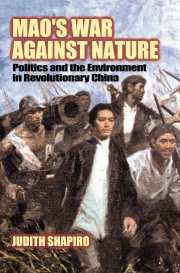Book contents
- Frontmatter
- Contents
- Chinese Measurement Equivalents
- Preface
- INTRODUCTION
- 1 POPULATION, DAMS, AND POLITICAL REPRESSION
- 2 DEFORESTATION, FAMINE, AND UTOPIAN URGENCY
- 3 GRAINFIELDS IN LAKES AND DOGMATIC UNIFORMITY
- 4 WAR PREPARATIONS AND FORCIBLE RELOCATIONS
- 5 THE LEGACY
- Notes
- Bibliography
- Index
- Plate section
2 - DEFORESTATION, FAMINE, AND UTOPIAN URGENCY
How the Great Leap Forward Mobilized the Chinese People to Attack Nature
Published online by Cambridge University Press: 15 August 2009
- Frontmatter
- Contents
- Chinese Measurement Equivalents
- Preface
- INTRODUCTION
- 1 POPULATION, DAMS, AND POLITICAL REPRESSION
- 2 DEFORESTATION, FAMINE, AND UTOPIAN URGENCY
- 3 GRAINFIELDS IN LAKES AND DOGMATIC UNIFORMITY
- 4 WAR PREPARATIONS AND FORCIBLE RELOCATIONS
- 5 THE LEGACY
- Notes
- Bibliography
- Index
- Plate section
Summary
The Anti-rightist movement quashed freedom of speech by turning more than half a million people into political pariahs and allowed Mao to pursue the Great Leap Forward virtually unopposed. The growing population about which Ma Yinchu had cautioned was seen as providing extra hands to catapult China toward a brilliant socialist destiny. Construction of the dams Huang Wanli and others had opposed went forward rapidly, intended to harness the great rivers once and for all. Smaller water conservancy projects such as reservoirs, holding pools, wells, and irrigation canals also engaged the labor power of millions; in 1958 alone, some 580 million cubic meters of earth were moved. Urgently and rapidly, through extraordinary efforts, the Chinese people were tasked with overtaking Britain in steel production within fifteen years, raising agricultural yields, and achieving socialist transformation in the countryside by combining rural collectives into vast People's Communes. The conquest of nature and prosperity of humankind were believed to be at hand through the miracle of socialism.
With the Great Leap Forward, the Maoist philosophy of voluntarism was given full expression in a great social mobilization. Although, like Marx, Mao held that human consciousness was shaped by material conditions, Mao also saw ideas as having the power to mobilize efforts to transform the material world. In the struggle for development, the will and energy of the masses would compensate for China's lack of sophisticated technology and equipment; ideas would unleash raw labor to conquer and remold nature.
- Type
- Chapter
- Information
- Mao's War against NaturePolitics and the Environment in Revolutionary China, pp. 67 - 94Publisher: Cambridge University PressPrint publication year: 2001

